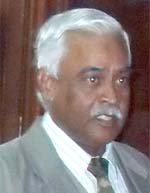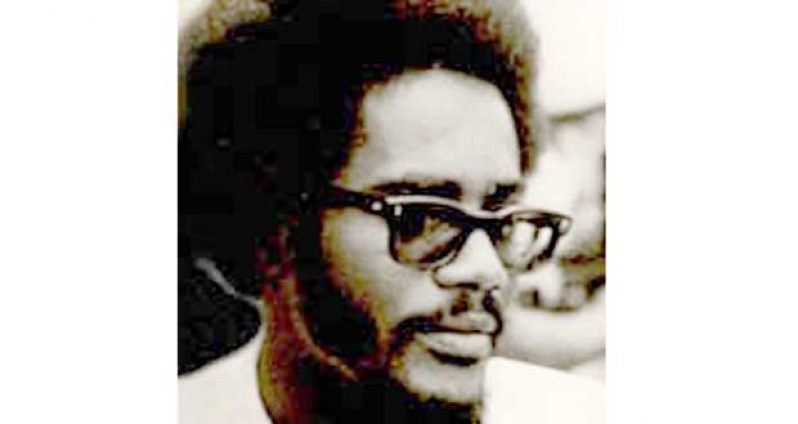Special Report on the Rodney Commission of Inquiry by Shaun Michael Samaroo
Detailing PNC State machinery violence against WPA at Rodney Commission
Ramson wanted Smith extradited
FORMER Attorney General of Guyana,Justice Charles R. Ramson, yesterday testified at the Presidential Commission probing the assassination of Dr. Walter Rodney, how anatmosphere of political paranoia harmfully affected him.

“The paradox of contradictions I experienced was that some members of the People’s Progressive Party (PPP) labelled me as WPA; the People’s National Congress (PNC) peddled the view that I was a PPP supporter; and the WPA considered me a PNC ‘plant’, maybe by virtue of my father’s public alignment with Mr. (Forbes) Burnham. However, to this day, I have never joined any political party,” Ramson told the distinguished Walter Rodney Commission of Inquiry, comprising outstanding legal luminaries from across the Caribbean.
Justice Ramson is appearing at the Commission to give testimony into the political atmosphere in Guyana when a bomb disguised as a communications device exploded in the lap of Dr. Rodney as he sat in his car on Camp Street on the dark night of Friday June 13, 1980, instantly killing the world-renown Guyanese scholar.
Dr. Rodney’s demise remained a cold case for 34 years, as the worst political assassination in the history of the Commonwealth Caribbean, and Ramson told the Commission that when he was Attorney General of this country he tried to solve the case.
Ramson’s comment in his Witness Statement to the Commission that he experienced a “paradox of contradictions,” with political parties labelling him partisan and biased, is a telling pronouncement: it speaks to the atmosphere of political paranoia in Guyana in 1978 to 1980, the period in which Dr. Rodney was assassinated and which is under probe at the Commission.
In this social environment of paranoia, division and lack of national unity, Dr. Rodney became leader of the Working People’s Alliance (WPA), and by 1979, was “attracting unusually large crowds of people, young and old, from all ethnic groupings and classes”, succeeding in leading a healing of the divides and a bringing together of the factions, as the “most prominent and articulate leader” of the WPA, and vociferous in his condemnation of the PNC’s authoritarian disregard for the civil and human rights of Guyanese.
As Attorney General, Justice Ramson particularly wanted to extradite the main suspect in the bombing, the late intelligence officer of the Guyana Defense Force (GDF), Gregory William Smith, to face a trial for the assassination of Dr. Rodney, from French Guiana to Guyana. However, Justice Ramson’s efforts proved futile, and the Commission became a reality only after President Donald Ramotar convened it early this year, in the face of vociferous, irrational and disquieting disapproval from the PNC and its disgruntled sympathisers.
Evidence at the Commission unfolds a dark, sinister era in Guyanese history under the PNC Government, when Smith became a double agent for the Joint Intelligence Command, under the leadership of ex-Commissioner of Police, the late Laurie Lewis, in a daring conspiracy to execute a deadly plot to assassinate the populist Dr. Rodney, whose civil revolt to unseat the PNC Government mobilised the Guyanese people into a united voice.
For the past three and a half decades, worldwide suspicion fingered the PNC Government as the main culprit in conspiring and executing the dark, sinister plot to assassinate Dr. Rodney. Testimonies at the Commission pile up showing the PNC Government as a paranoid authoritarian State that felt no qualm in denying citizens their rights. However, the PNC and its sympathisers blast the Commission, questioning its integrity and professionalism, ignoring the outstanding legal careers of Commissioners Jacqueline Samuels-Brown of Jamaica, Seenath Jairam of Trinidad and Tobago, and Chairman Sir Richard Cheltenham of Barbados.
Justice Ramson gave testimony that echoed much of what the Commission has heard over the past several months of public hearings at the High Court in Georgetown, noting that he faced intimidation, harassment, threats and bullying from the Police Force.
Naming names with ease, Justice Ramson became one of the first witnesses appearing at the historic Commission of Inquiry to identify high ranking Police officers as engaging in brutal violence and thug behaviour.
He grew up in Georgetown, and became politically aware at a young age, with his dad a close friend of then Head of State and leader of the PNC, Forbes Burnham. In fact, “by way of further reward for (my father’s) loyalty, I was offered by Mr. Burnham, then P.M., the position of the first Minister of Energy and Mines in 1973 after oil was discovered in the Takutu Basin in Region 9 but I respectfully declined,” Justice Ramson said.
Despite his close association with Burnham, Justice Ramson took a keen interest in the affairs of Trades Unions, and started representing them in matters against the State of the PNC Government.
He was, however, labelled anti-Government, with the Police targeting him.
Ramson’s comment in his Witness Statement to the Commission that he experienced a “paradox of contradictions,” with political parties labelling him partisan and biased, is a telling pronouncement: it speaks to the atmosphere of political paranoia in Guyana in 1978 to 1980, the period in which Dr. Rodney was assassinated and which is now under probe by the Commission.
In this social environment of paranoia, division and lack of national unity, Dr. Rodney became leader of the Working People’s Alliance (WPA), and by 1979, was “attracting unusually large crowds of people, young and old, from all ethnic groupings and classes”, succeeding in leading a healing of the divides and a bringing together of the factions, as the “most prominent and articulate leader” of the WPA, and vociferous in his condemnation of the PNC’s authoritarian disregard for the civil and human rights of Guyanese.
Justice Ramson said he started attending these large meetings in Georgetown, at Merriman’s Mall, Waterloo and Middle Streets Junction, Campbell Ave., Kitty, and Kitty Market Square.
But he noticed that top Police officers worked as thugs to break up the meetings, beating attendees and causing mayhem and confusion. “At all these meetings, uniformed Policemen and Special Branch operatives would be in attendance, some recording in diaries the names of persons and even the registration numbers of cars parked in the vicinity. Supt. Bentick, Inspector Chandra Lall of Alberttown Police Station and Snr. Supt. Carlos Prince, who was popularly known as ‘Idi Amin Dada’, then second-in-command of ‘A’ Division, because of his vicious conduct and his close resemblance to the then President of Uganda, were some of the more visible officers.”
Justice Ramson said in the course of his work as attorney in the courts in Georgetown he became familiar with members of the Police Force.
“In addition, hecklers comprising House of Israel members and other vicious thugs would seek to break up these meetings or terrorise the spectators, in full view and without any serious attempt by the uniformed ranks to intervene or maintain the peace,” he said.
At one such meeting, Justice Ramson and Ian Chang, now Chief Justice (ag), then a staffer at the office of Director of Public Prosecutions (DPP), were attending a WPA meeting, and before it could start, the Police used violence to disperse potential attendees.
“I refused and one of them, in full view of Bentick, lashed and poked me in my midriff area with a baton. They said or did nothing to Chang! We re-entered my car for fear of my life and drove away,” Ramson told the Commission.
He filed legal action against the PNC Government, and lost the case, although he eventually won on Appeal. “Mr. Chang who testified on my behalf was sharply rebuked by the Chief Justice (V. E. Crane) for his involvement,” Ramson said.
Justice Ramson resumes the witness stand this morning, in a week that sees the Commission host some high profile names as witnesses.
Yesterday’s testimony sees the experienced, accomplished and highly regarded former Attorney General add a dimension to the piling up of evidence against the PNC Government’s draconian, dictatorial, repressive, paranoid rule of Guyana, whereby even the Judiciary suffered from the PNC State machinery’s crackdown on human rights, freedom of assembly and freedom of speech, and authoritarian control of citizen rights.
In such a poisoned political atmosphere, Dr. Rodney, along with several other members of the WPA, were killed in shadowy violence allegedly involving State organs of the PNC Government.
The Presidential Commission will issue an official report of its findings after the completion of its public hearings in Georgetown.




.jpg)









